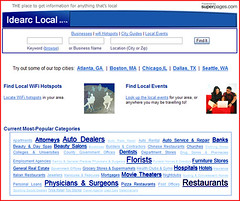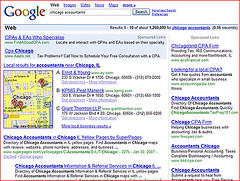Local Search Mentions in the News
It was cool that Greg Sterling mentioned one of my projects during the last week — IdearcLocal.com (the site was previously known as “VZlocal.com”, prior to our recent divestment from Verizon Corporation):
It’s always gratifying to have one’s work get noticed!
In a less-than-glowing mention of me, David Naffziger, VP of Strategy and BizDev at Judy’s Book, was critical of my recent article on Extreme Local Search Optimization Tactics. He apparently feels that some of these tips could result in “spamming” online directory listings. I beg to differ, of course. (Not to be too pedantic, but his use of the word, “spam”, is inaccurate because spam is the mass-mailing of unsolicited email notes of a commercial nature. My posting had nothing to do with email. Heh!)
Read on for my rebuttal on this and some more local search news.
But, let me not be too disingenuous, since I know he really intended to mean that the tips threatened to degrade the quality/usability of online directories. He has a point in that some particular headings have experienced a virtual “arms race” where many businesses have vyed to see who can come up first, and he cites a particular problem that Judy’s Book has experienced in this respect. Most headings don’t have this problem going on.
However, I’d point out two things: First, they can limit this effect by requiring that listings in their directory might only display their legally-licensed business names. Second, if a business has legally created a name with the gobbledygook he so dislikes, what exactly do they propose to do — disallow the business from being listed under their legal name?!? That would hardly be fair, and that sort of aesthetic bias might even be actionable. Businesses which go overboard with that sort of strategy will shoot themselves in the foot anyway, because after a certain point they’ll damage their own image and ability to get user referrals. Users would be naturally drawn to more credible-looking business names.
He also came down hard on the concept of getting a listing for each city in which your business provides service. I’d counter that if a plumber provides service in that city, he should be allowed to be listed in that directory, and I do *not* see that as any sort of a detractor for users. Users should be given the choice of all businesses that provide service for their area! I’d guess that Dave’s main concern on this point is that it makes it difficult for Judy’s Book to generate a unified user rating profile for the business if it’s spread out on multiple listings — they’d end up with multiple, different ratings for a single business. Perhaps they should offer a way to associate those listings together, instead of unfairly persecuting the proprietors for wanting representation in all the areas where they do business. At Superpages, we offer a “Metro-buy” option for advertisers that automatically gives them coverage in the multiple cities that make up their Designated Metro Area (“DMA”).
In any case, most of the tactics I mentioned were dubbed “extreme” for a reason — most of them are simply impractical for most businesses to pursue, and as such, they’re unlikely to be used by large numbers of businesses any way. So, no real need to fret that these would cause major quality degradations!
It’s doubly ironic that Dave would accuse me of causing “spamming”, since he actually has mentioned some SEO tactics that he apparently admired which are completely black-hat, and are terribly bad advice for any webmaster to pursue. He laud’s BlueHatSEO’s, blog, specifically highlighting a link laundering scheme, and a scheme to subvert captchas. The link laundering scheme is basically a link exchange system, and Google specifically recommends against linking schemes of this sort. Subversion of captcha security is used by vile black-hat SEOs specifically in order to compromise forums in order to deploy their links automatically into blog comments, online guestbooks, etc. BlueHatSEO specifically mentions “spamming” MySpace and Yahoo through captcha subversion. These tactics may initially generate traffic, but they’re not sustainable, and captcha subversion is downright unethical. Search engines can detect methods such as this, and once they detect it, they can penalize you, making your traffic disappear overnight. “Caveat linkor” — let the linker beware.
Good SEO practices are not any harder than the bad — don’t try to take shortcuts in this or you’ll cost yourself more in the long run.
Finally, in the big local search news getting mentions all over, Google announced this week that they have expanded their one-box local search results at the top of their web search results pages:
Previously, Google displayed three business listings for particular [keyword + locality] parameter search requests, at the top of their SERPs. This change added a map alongside those listings, and they also added links to “reviews” and “More information” which take the user over to those pages in their Google Maps interface. Google had already begun displaying a similar map interface last year, for [(business name) + locality] searches.
Kudos to my acquaintences over in the Google Maps team — very nice work on this integration! This seems to be a nice way to pull in some of their local search content into the regular web search results, and it works well for the user-experience.
Now, many of us in the local space are wondering what effect this may have on all the natural search listings which have been pushed down a bit on the page as a result. Will the other listings on the page experience reduced click-through rates as a result? After all, the “heat-zone” maps generated from user eye-tracking studies all indicate that users tend to click on content at the top left side of the pages more. Just based on that research, one could reasonably assume that users might now click more on the Google OneBox local content more than on all the other content below it. Yet, there’s indications that users are less likely to click on the sponsored links that may appear above the natural search result listings, and that kind of behavior could translate over to these local listings as well…Â To soon to tell yet.
Â
Possible Related Posts
Posted by Chris of Silvery on 02/01/2007
Permalink | |  Print
| Trackback | Comments Off on Local Search Mentions in the News | Comments RSS
Print
| Trackback | Comments Off on Local Search Mentions in the News | Comments RSS
Filed under: Google, Local Search, Local Search Optimization black-hat-seo, idearc, Local Search




No comments for Local Search Mentions in the News
No comments yet.
Sorry, the comment form is closed at this time.